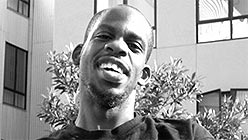Do you think the issue of image is even more prevalent in the hip hop genre?
It’s an issue across the industry, but I think it’s harder in hip hop, because hip hop, especially now, is all about image. It’s all about being tough, and that male energy is so present. I think hip hop sees disability or other forms of identity as weakness. After the radio show, we did a conference on krip hop and homo hop, bringing those two communities together. Before I started Krip Hop, I used to go to the PeaceOut HomoHop Festival. I just watched and I really learned. I realized both communities, the disabled hip hop community and homo hop community, have similar experience about being accepted and being seen as un-“mainstream.” I also found out that homo hop and krip hop both have a rich underground history.
But hip hop started out as music for disenfranchised people.
Exactly, and that’s what’s so interesting because, in my experience growing up in New York, I saw early hip hop on the streets as diversity. I saw women scratching and DJing. I saw people on crutches breakdancing. It wasn’t like a utopia, but it was diverse, as compared to now, which is just about bling-bling for the record labels.
So I’m interested in the use of the word “crippled” in all these book and album titles, and even in the name of your organization. Isn’t “crippled” a taboo word?
The reason behind that is we’re taking it back. We’re really using it to reflect on what society has said about us, and using it in an empowering kind of way. And we’re also using it in a way that connects to history because there were a couple blues artists that named themselves “Crippled.” So we’re taking it, twisting it, and putting it back out there.
I using the K in Krip, because I don’t want any mix up with the gang the Crips, of Crips and Bloods. People think the word “Crip” came from those gangs, but really, the history is that members in the gang were on crutches, so the neighborhood called them Crippled, so they shortened it to Crip. In the beginning, people, especially men, were scared to be involved with Krip Hop because of the word. They think the gang has some kind of copyright of the word. It’s totally strange because hip hop has a history of taking a word and twisting it. I’m exposing the real roots of it. It wasn’t the gang in the first place; it came from people with disabilities.
So you and Keith Jones will be doing a song at Krip Hop about being profiled recently. Do you run into that assumption a lot here in the Bay Area, that being black and disabled means you’re homeless?
Oh yeah. You’d think that we live in the liberal Bay Area – and, you know, the disability rights movement started in Berkeley — so why am I getting stopped?
In Oakland and San Francisco, you were stopped and questioned by hotel security guards the same month. Was it also a hotel in New York?
In New York, I was in this card shop, just looking around. I noticed that the security guard was walking past me a lot. I turned around, and he was like, “I hate to say this, but you are making us nervous.” I was like, “What?” He wanted to know what was under my coat. I said, “It’s just my pouch.” I look up, and it was him, the cashier, and NYPD, I was like, “What’s going on?” He said, “I’m sorry I’m sorry I’m sorry.” I said to them, “I’m making you nervous? You’re the ones with the gun!” It was strange. I was going to buy something for my girlfriend, but I put it back and just left.
What do you hope people take away from the Krip Hop Nation conference?
I hope people take away that they need to question; they need to question authority, they need to question textbooks. They need to go back to their neighborhood, find who’s really in their community, and learn about a different history. Black history is not a monocultural experience. You have black gays, you have black lesbians, you have black people with disabilities. Learn from us, listen to us. We all know about racism and sexism, so I hope they’ll consider ableism in their attitudes. I have a trivia list of black disabled history, and every time I do presentations at colleges and schools, teachers are like, “Oh, I want to have this for my class!” It tells me that it’s getting out there. It’s changing the way people teach and people learn.
My nephew Sasha grew up with my sister and me, and he’s 9 now. When he was in kindergarten, he went to school and he said, “I want to walk like my uncle.” It’s so cute! It’s the way that my sister parented him. I just wish all parents had that kind of experience. It would totally eliminate discrimination. Can you imagine all children growing up like that? It would be a totally different world.
Krip Hop Nation stands on history. That’s what I want to really get across. It’s not Leroy doing this. It’s just a history that’s been oppressed for such a long time. That’s what I want to get out there: Dig deeper. Open your eyes and find out about black deaf history, black blind blues history. It’s so rich.


